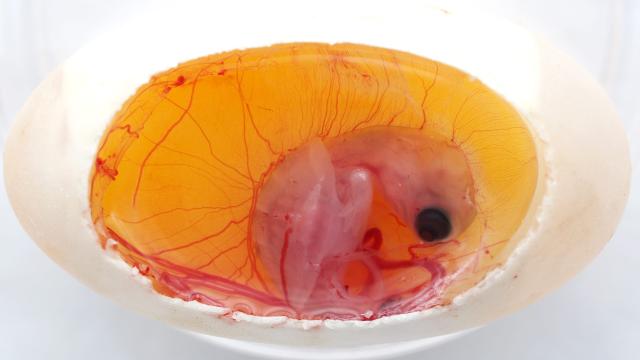New research suggests that turtle embryos influence their own biological sex by moving around inside their egg before they hatch, according to a new study.
Certain reptiles have evolved such that the temperature in the nest determines the sex of the offspring. This has made one team of researchers wonder how these species have survived periods of extreme temperatures and how they might survive climate change, which could shift the ratio of birth sexes. They now think that turtles embryos are altering their position inside the egg to buffer against these extreme climate shifts.
“The discovery of this surprising level of control in such a tiny organism suggests that in at least some cases, evolution has conferred an ability to deal with such challenges [as climate change],” Wei-Guo Du, the study’s corresponding author from the Chinese Academy of Sciences, told Gizmodo.
Experiments have already shown that these embryos can move around inside of their eggs. But the scientists hoped to measure whether the temperature gradients in the eggs and the embryo’s room to move was enough for the embryos to regulate their own temperature.
The researchers performed several tests on turtle eggs, including measuring just how much the temperatures varied inside the egg when they applied heat to just one side. They also injected some of the eggs with the drug capsazepine, which blocks a receptor used by animals as a temperature sensor. They were interested in, when partially heating the eggs, which embryos would adjust their position or whether they’d just take the heat, in turn altering the sex ratio.
When the team unevenly heated the eggs, the capsazepine-treated eggs moved less than those who hadn’t been treated with capsazepine, according to the paper published in Current Biology. And as a result, fewer capsezepine-treated eggs hatched into females than those without capsazepine. Basically, the researchers observed that when the turtles could feel temperature, there seemed to be more parity between the sexes, but when they couldn’t, there were more of either sex.
Scientists not involved in the work gave me mixed reactions as to whether the study convincingly proved its hypothesis. Turk Rhen, a professor in biology at the University of North Dakota who studies temperature-dependent sex determination, had issues with the experimental design. Other variables, like how the researchers held or tilted the egg, would potentially jostle the embryo around, and he thought that the way the researchers looked into the eggs — basically shining a light through them and looking at the embryo’s shadow — could provide inexact measurements of the movement. He also pointed out that there are other confounding factors that could affect a clutch’s sex ratio, like which specific individual gave birth to the egg.
But regardless, Jeanine Refsnider, an assistant professor in environmental sciences at the University of Toledo who found the results convincing, warned that this experiment’s findings aren’t generalisable beyond the Chinese pond turtles that they studied. Making more broad statements about reptiles would require followup studies.
Ultimately, the researchers are trying to answer an important question: What will climate change’s effects be on species that rely on temperature to determine the sex of the offspring? Perhaps this sort of regulation by the embryos themselves could be important to ensuring that these species continue to have parity between the sexes so they can continue reproducing. It will take more experimentation to find out for sure.
